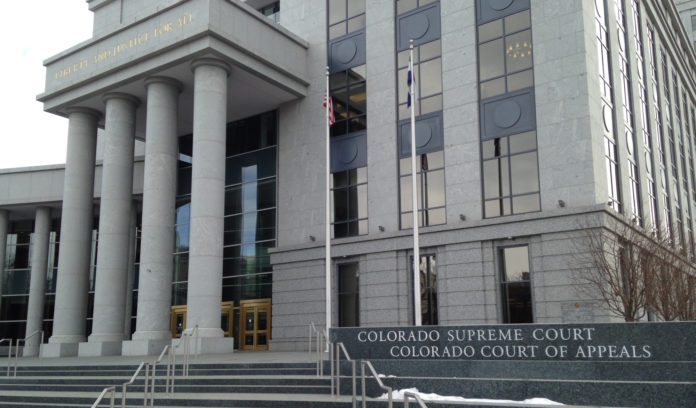
The Colorado Supreme Court will hear oral arguments for five cases June 20-21 including one related to defamation.
Killmer, Lane & Newman, LLP et al. v. BKP, Inc. et al.
According to a Colorado Court of Appeals opinion, the plaintiffs BKP, Inc. and Ella Bliss Beauty Bar, L.L.C. sued attorney Mari Newman, law firm Killmer, Lane & Newman, LLP and Towards Justice, a nonprofit law firm representing workers in litigation.
The attorneys at the firms had filed a class action lawsuit in federal court on behalf of a nail technician who worked for the employer. The complaint alleged the employer violated wage and employment laws.
On the same day the case was filed during a press conference announcing the federal lawsuit, Newman was accused of making four allegedly false statements. The attorneys also issued a press release containing allegedly false statements.
The alleged false statements Newman is accused of making at the press conference are:
- “For no pay whatsoever, [the nail technicians] have to clean the business, including the bathrooms, because [the employer] is simply too cheap to pay its workers the money they deserve.”
- “Instead of paying the [nail technicians] for every hour that they work, [the employer] pick[s] and choose[s] and only pay[s] for the hours [it] feel[s] like paying.”
- “It is time for businesses to quit financially exploiting women. Oppression of vulnerable workers remains all too common, and this is a particularly audacious case.”
- “It’s fairly common in industries that employ populations they think they can take advantage of, like women or immigrants.”
The third spoken statement was included in the press release as was another statement that was allegedly false: “[the employer] forced its [nail] technicians to perform janitorial work without pay, refused to pay overtime, withheld tips, and shorted commissions.”
About a year after the statements were made, the employer sued the attorneys, asserting the statements from the press conference and press release were defamatory and intentional interference with contractual relations.
The attorneys asked the trial court to dismiss the claims, arguing the statements weren’t actionable as defamation because they were either subject to litigation privilege, protected by the Noerr-Pennington doctrine, or opinions protected by the First Amendment.
The trial court granted the attorneys’ motions to dismiss.
The employer appealed and the Colorado Court of Appeals affirmed in part, reversed in part and remanded the case to the trial court for further proceedings.
According to the appeals court opinion, the Noerr-Pennington doctrine is named after two U.S. Supreme Court cases.
In the 1961 case Eastern Railroad Presidents Conference v. Noerr Motor Freight, Inc., the U.S. Supreme Court held that a business’s publicity campaign in support of the passage of certain types of legislation was petitioning activity immune from antitrust liability under the Sherman Act, even though the legislation could harm the business’s competitors.
In the 1965 U.S. Supreme Court case United Mine Workers v. Pennington, the U.S. Supreme Court decided “[j]oint efforts to influence public officials,” even if they are designed to destroy the competition, were consistent with Noerr and immune from antitrust liability.
The U.S. Supreme Court extended the doctrine in the 1972 case California Motor Transport Co. v. Trucking Unlimited, reasoning the same philosophy underlying Noerr and Pennington governs the approach of individuals or groups of citizens to administrative agencies and the courts, concluding the right of access to courts is one aspect of the right to petition.
The appeals court affirmed the trial court’s determination that some of the statements Newman made at the press conference were opinions protected by the First Amendment. But the appeals court reversed the trial court’s determination that the first part of Newman’s first statement (“For no pay whatsoever, they have to clean the business, including the bathrooms”), her second statement and one statement in the press release (“[The employer] forced [the nail] technicians to perform janitorial work without pay, refused to pay overtime, withheld tips, and shorted commissions”) were protected by the Noerr-Pennington doctrine and weren’t protected by the litigation privilege.
According to the appeals court opinion, the trial court’s order didn’t address the attorneys’ litigation privilege argument. The opinion explained a previous Colorado Court of Appeals decision from 1985, Club Valencia Homeowners Ass’n v. Valencia Assocs. noted Colorado adhered to the description of the privilege from the American Law Institute: a lawyer is privileged to publish defamatory matter about another person or party in communications preliminary to a proposed judicial proceeding, or in the institution of or during the course and as a part of a judicial proceeding the lawyer participates in as counsel if it has a relation to the proceeding.
According to Club Valencia, the purpose of the privilege is to give litigants the freedom of access to the courts to preserve and defend their rights and protect attorneys during the course of representing their clients. The appeals court noted the litigation privilege has been refined over the years by Colorado Court of Appeals cases, but “no Colorado case has considered whether the litigation privilege should extend to statements made during press conferences or in press releases that occur or are issued after litigation has begun.” The appeals court looked to other states for guidance.
The appeals court concluded under the facts of the case, neither the litigation privilege nor the Noerr-Pennington doctrine applies to shield attorneys from certain allegedly defamatory statements made during a press conference and in a press release.
The Colorado Supreme Court granted the petitioner’s writ for certiorari and focused on the question of “whether the common law litigation privilege for party-generated publicity in pending class action litigation excludes situations in which the identities of class members are ascertainable through discovery.”
To find out more about the June oral arguments, click here.
CORRECTION NOTE: This story was updated June 28 to clarify a comment on the litigation privilege.

